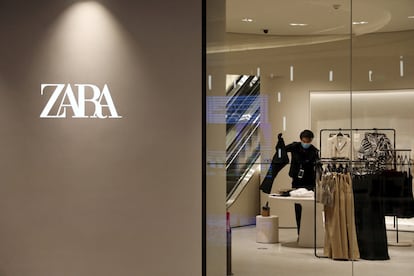A pioneering bill to slow down fast fashion gets approval from French lawmakers
The bill will introduce stringent measures, including banning advertising for the most inexpensive textiles and imposing an environmental levy on these low-cost products

A pioneering bill to curb the rampant pace of fast fashion won unanimous approval in the lower house of the French Parliament, making France one of the first countries in the world to target the influx of low-cost, mass-produced garments predominantly from China.
The fashion industry is among the world’s biggest producers of greenhouse gas emissions. France is seeking to reduce the allure of fast fashion items, setting a precedent in the fight against the environmental degradation they cause.
This week, all lawmakers voting unanimously approved the bill, greenlighting it for the Senate to consider before it can become law.
Christophe Béchu, the Minister for Ecological Transition, hailed the vote as a historic step towards reining in the “excesses” of fast fashion. The bill will introduce stringent measures, including banning advertising for the most inexpensive textiles and imposing an environmental levy on these low-cost products.
The bill specifically targets fast fashion giants, calling for companies to disclose their products’ environmental impact. This move seeks to pivot the industry towards more sustainable practices, encouraging transparency and accountability.
It’s a measure that promotes environmental protection and aims to safeguard France’s prized high fashion industry—in a week when French President Emmanuel Macron feted luxury giant LVMH CEO Bernard Arnault with the Légion d’Honneur, France’s greatest civilian honor.
Renowned for luxury brands such as LVMH’s Louis Vuitton and Chanel, France has seen its lower-end market sectors suffer due to stiff competition from fast fashion retailers like Zara, H&M, and the emerging Chinese powerhouses Shein and Temu.
By imposing these measures, France aims to level the playing field and promote a more sustainable fashion landscape.
However, producers such as Shein have countered the criticism, long arguing that their business model, albeit fast, effectively keeps the proportion of unsold garments very low. This, they claim, contributes to reducing waste—a crucial aspect of sustainability in fashion.
Luxury giants such as LVMH and Kering regularly face criticism for the billions of dollars of unsold inventory each year.
The French bill paves the way for future action, including a proposed EU-wide ban on the export of used clothing to tackle the escalating problem of textile waste.
Sign up for our weekly newsletter to get more English-language news coverage from EL PAÍS USA Edition
Tu suscripción se está usando en otro dispositivo
¿Quieres añadir otro usuario a tu suscripción?
Si continúas leyendo en este dispositivo, no se podrá leer en el otro.
FlechaTu suscripción se está usando en otro dispositivo y solo puedes acceder a EL PAÍS desde un dispositivo a la vez.
Si quieres compartir tu cuenta, cambia tu suscripción a la modalidad Premium, así podrás añadir otro usuario. Cada uno accederá con su propia cuenta de email, lo que os permitirá personalizar vuestra experiencia en EL PAÍS.
¿Tienes una suscripción de empresa? Accede aquí para contratar más cuentas.
En el caso de no saber quién está usando tu cuenta, te recomendamos cambiar tu contraseña aquí.
Si decides continuar compartiendo tu cuenta, este mensaje se mostrará en tu dispositivo y en el de la otra persona que está usando tu cuenta de forma indefinida, afectando a tu experiencia de lectura. Puedes consultar aquí los términos y condiciones de la suscripción digital.








































